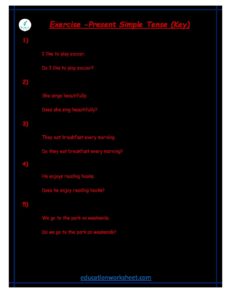Simple Tense affirmative examples
Simple Tense affirmative examples
Present Simple Tense Affirmative Examples
The present simple tense is used to describe actions or states that are habitual, factual, or general truths. It is formed by using the base form of the verb, often with the addition of ‘s’ or ‘es’ for third-person singular subjects (he, she, it).
- I play the guitar.
- She teaches English.
- They live in New York.
- The sun rises in the east.
- We eat dinner at 7 PM every day.
In these examples, the verbs ‘play,’ ‘teaches,’ ‘live,’ ‘rises,’ and ‘eat’ are in the present simple tense. This tense is used for actions that happen regularly or are universally true. The addition of ‘s’ or ‘es’ in the third-person singular helps differentiate it from other subjects.
Past Simple Tense Affirmative Examples

The past simple tense is used to describe actions or events that happened at a specific point in the past. It is typically formed by adding ‘-ed’ to regular verbs, while irregular verbs have unique past tense forms.
- She visited Paris last summer.
- He graduated from college in 2010.
- They watched a movie yesterday.
- I cooked dinner for my family.
- The company launched a new product last year.
In these examples, the verbs ‘visited,’ ‘graduated,’ ‘watched,’ ‘cooked,’ and ‘launched’ are in the past simple tense. Regular verbs follow a straightforward pattern, but irregular verbs, like ‘go’ (went), ‘be’ (was/were), and ‘have’ (had), have unique past tense forms that need to be memorized.
Future Simple Tense Affirmative Examples

The future simple tense is used to describe actions or events that will happen at a specific time in the future. It is formed using the auxiliary verb ‘will’ (or ‘shall’ in some cases) followed by the base form of the verb.
- I will meet you at the park tomorrow.
- She will start her new job next week.
- They will travel to Europe next summer.
- He will complete his project by Friday.
- We will visit our grandparents on Sunday.
In these examples, the auxiliary verb ‘will’ is used to indicate future tense, and the base form of the verb follows. Note that the future simple tense is quite straightforward, as it does not involve complex conjugation.
Additional Considerations
- Negative and interrogative forms of simple tenses involve the use of auxiliary verbs like ‘do’ (in the present and past simple) and ‘will’ (in the future simple).
- The use of adverbs and time expressions can provide additional context to these tenses. For example, “I always go to the gym” (present simple with the adverb ‘always’) or “She finished her homework yesterday” (past simple with the time expression ‘yesterday’).
- Simple tenses are often used in conjunction with other tenses to provide a more detailed and nuanced account of actions and events. For example, “I have lived in this city for five years” (present perfect) or “He had already left when I arrived” (past perfect).
Simple Tense affirmative examples

Simple tenses are fundamental in English, providing the foundation for more complex tenses and expressions. These examples should give you a good understanding of how to form and use simple tense affirmatives in various contexts.


